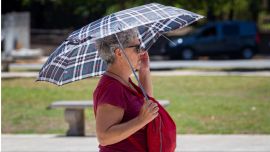As the final tally of the vote became known, the sea of green erupted outside of Congress in celebration.
In a historic vote closely watched by millions across the country, the lower house of Congress on Thursday approved a bill that would legalise elective abortion in the first 14 weeks of pregnancy, sending the measure to the Senate.
Thousands of abortion rights activists cheered and hugged outside the Congress as the Chamber of Deputies passed the bill by 129 votes to 125. Just hours earlier, the vote had hung on a knife-edge until a late swing pushed it toward approval.
As in most Latin American countries, abortion is illegal in Argentina, except in cases of rape or when the life or health of the woman is at risk.
The bill, if passed by the Senate, would decriminaliae abortion during the first 14 weeks of pregnancy, and beyond that in cases where the infant would not survive after birth.
The issue has strongly divided society: while Argentina was the first Latin American country to legalise same-sex marriage in 2010, it remains strongly influenced by the Catholic Church and by Pope Francis, a former archbishop of Buenos Aires.
Argentina’s bishops lamented the result, saying: “As Argentines, this decision hurts us.”
President Mauricio Macri, who made it clear from the outset that he was “in favour of life,” described the debate as “historic” and said it showed “we have been able to resolve our differences with respect.”
MARATHON DEBATE
Lawmakers wrangled through more than 22 hours of emotionally charged debate. Nearly all 257 members spoke before the vote was taken, as activists on both sides of the divide kept vigil in the streets outside.
It was unclear up to the last minute if the measure would be approved or defeated. As many as 30 lawmakers were undecided before the debate began on Wednesday, and one lawmaker abstained from voting.
Many lawmakers had said they would put their religious convictions aside to support the measure.
When the result was announced, legislators who voted in favor leapt to their feet and hugged their neighbours, while opponents slumped in their seats.
In the streets abortion rights activists cheered and danced, while anti-abortion demonstrators hugged and wept.
“The mobilisation has been decisive and what happens in the Senate will depend a lot on continuing to mobilise public support,” said Teresa Giani, 48.
“I think it is very good that they are legislating for the problems of women,” said Inés Rivas, 62. When women become lawmakers and enter Congress “they defend the rights of women,” she said.
“Argentines are religious, and they will continue to be,” said Micaela González, a 21-year old university student. “Catholics have abortions, but with this law now they will be able to so safely.”
The debate inside Congress was closely watched by tejns of thousands outside the building and online. As the debate drew to a close, speeches by lawmakers spread across social media, including one by PRO lawmaker for Buenos Aires province, Silvia Lospennato, who dedciated her vote in favour to Argentina’s women.
“To the coalition of women who have come, and are here to stay, in Argentine politics, united in our differences but always in favor of women,” she said. “To the women in your homes, our mothers, and our daughters. Let abortion be legal, safe, and free. Let it be law.”
UCR lawmaker Luis Pastori, however, said it was “absurd and unjust to sanction a law that enables the killing of human beings that must be respected from the moment of conception.”
SENATE NEXT UP
The bill will now go before the Senate, where it was thought likely to face an uphill battle to become law.
However, in the hours following Thursday’s vote, former president and now senator Cristina Fernández de Kirchner’s Victory Front-PJ voting bloc removed a major obstacle to the bill by saying it would vote in favour.
The move was further evidence of the growing momentum building behind the bill.
“In response to a societal demand that has been strongly expressed through the Womens’ Movement, the FpV-PJ bloc of senators confirms that it will, in its entirely, vote in favour of the bill that passed the Lower House,” the bloc said in a statement published on Twitter.
While senators are not expected to debate the bill in the immediate future, according to reports this week, the Télam state news agency reported that 27 senators have already announced that they will vote against the bill. Seventeen will vote in favour, the agency added, leaving 28 who have yet to announce which way they will vote.
Senator Miguel Ángel Pichetto (Río Negro), a Peronist opposition leader in the chamber, indicated that he would let his bloc vote with its conscience, but he said the vote had created “an unstoppable effect, and I am confident the law will be approved.”
Cambiemos (Let’s Change) coalition member Luis Naidenoff (UCR-Formosa), meanwhile, said “the Senate has to take into account citizens’ demand and legislate for realities, abortion is not a question of faith but of public health.”
According to Health Ministry data, more than 17 percent of the 245 recorded deaths of pregnant women and girls in 2016 were due to abortion.
The Ministry estimated in 2016 that the country sees as many as half a million clandestine abortions each year, with dozens of women dying as a result.


























Comments